Key takeaways:
- Seasonal spending varies greatly due to holidays and cultural events, necessitating mindful financial planning to avoid post-holiday financial strain.
- Budgeting for seasonal expenses allows for better prioritization of spending, transforming potential stress into joyful anticipation of events.
- Utilizing finance apps can improve spending habits by providing tracking, insights, and automated features that enhance financial awareness and decision-making.
- Setting specific seasonal spending goals and regularly adjusting budgets based on past patterns leads to improved financial management and satisfaction.
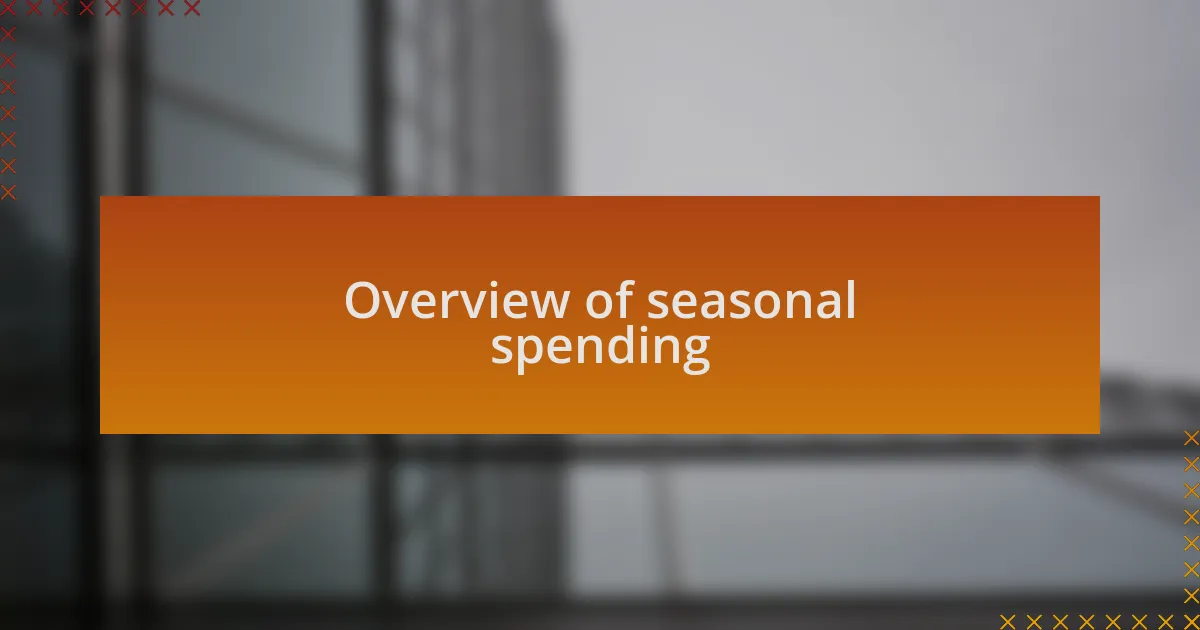
Overview of seasonal spending
Seasonal spending refers to the fluctuations in consumer spending that vary throughout the year, often influenced by holidays, changing weather, and cultural events. I remember the excitement of the holiday season, where budgeting often took a backseat to holiday cheer. Have you ever found yourself splurging on gifts or decorations, only to feel the pinch come January?
As the seasons shift, our spending habits can change dramatically, often leading to unexpected financial strain. For instance, summer might bring about expenses related to vacations and outdoor fun, while back-to-school shopping might suddenly crop up in late summer. Reflecting on these patterns can help us understand just how much influence the seasons have on our wallets.
I’ve also noticed that seasonal spending isn’t just about the big-ticket items; it often includes small, impulsive purchases that add up over time. Think about those sunny days that lure you into cafes or the cozy evenings that make you want to order takeout. Does this resonate with you? It certainly has for me, and it emphasizes the importance of staying mindful of our spending habits, especially during these times.
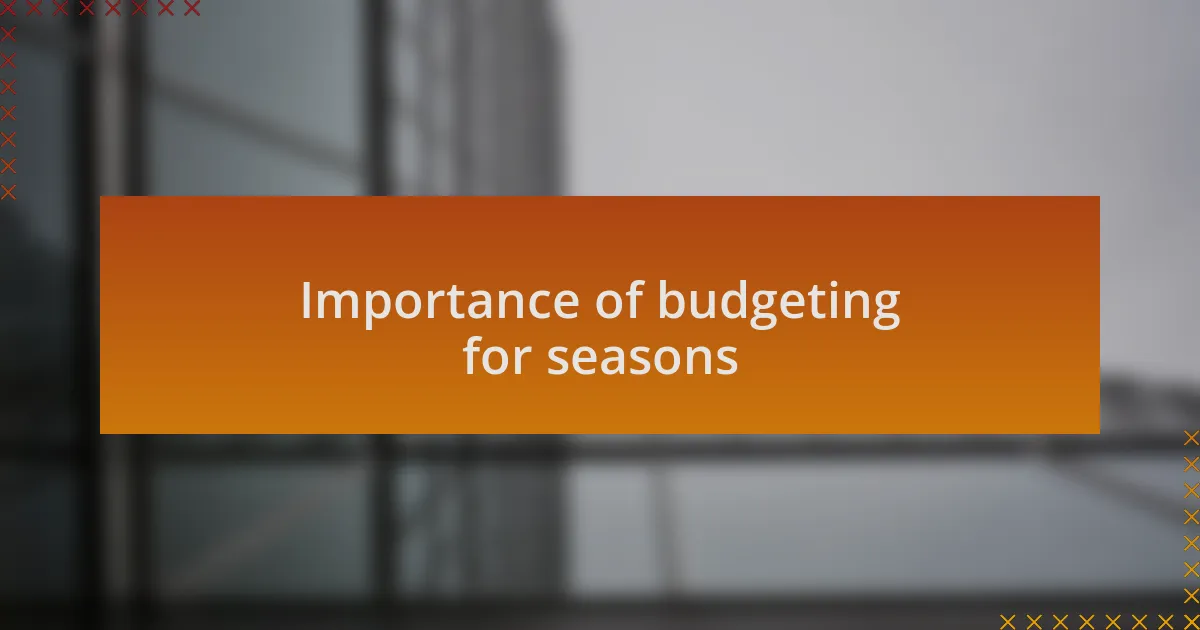
Importance of budgeting for seasons
When it comes to managing our finances, budgeting for seasons is crucial. I’ve found that mapping out my spending during holidays like Christmas or occasions like summer vacations helps me avoid those dreaded post-holiday credit card bills. Have you ever faced an unexpected financial hangover after overspending on gifts or festivities? It feels overwhelming, and that’s why planning ahead can really save us from those stressful moments.
You may think budgeting limits enjoyment, but I see it differently. In my experience, having a budget allows me to prioritize what truly matters, like sharing experiences with family or indulging in a favorite hobby. When I allocate funds for seasonal activities, I can enjoy them guilt-free, knowing I won’t strain my finances later on. This makes every seasonal outing more rewarding, doesn’t it?
I also appreciate how seasonal budgeting helps me spot patterns in my spending. For instance, I’ve learned that I tend to overspend in the fall with all the festive dinners and decorations. By tracking these expenses, I can adjust my budget accordingly. It’s fascinating how being proactive can transform potential stress into joyful anticipation. Have you considered how seasonal budgeting can reshape your financial journey?
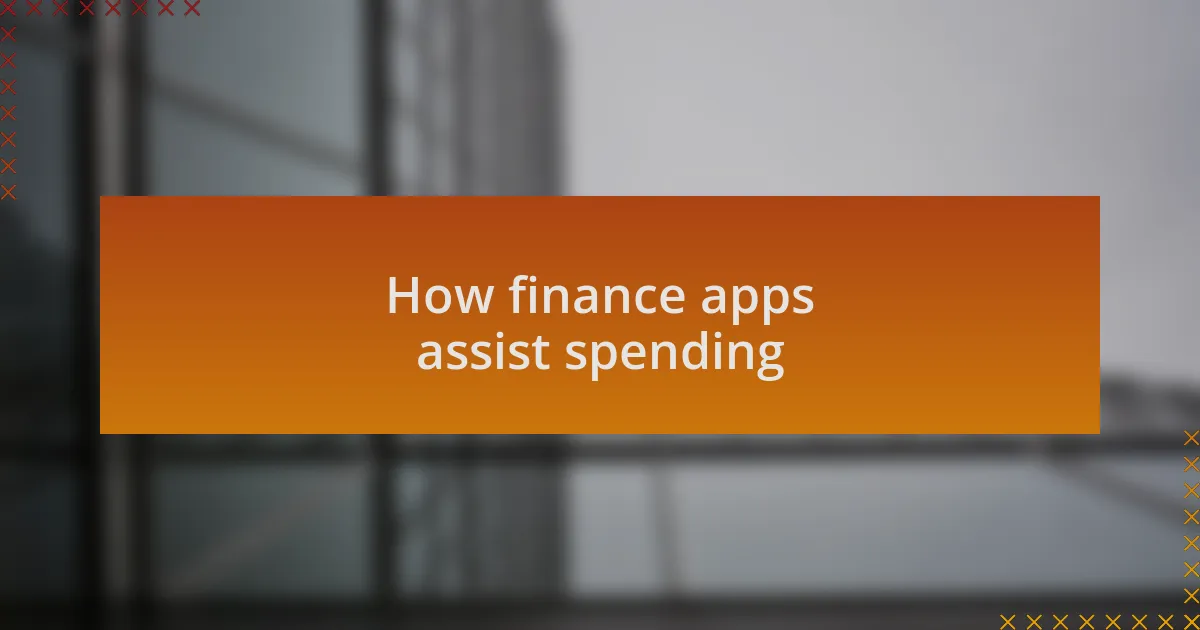
How finance apps assist spending
Finance apps play a pivotal role in assisting my spending habits by providing real-time tracking and thoughtful analysis of my finances. For example, I remember a holiday season when I used an app to categorize all my expenditures. The app highlighted that I was spending more on last-minute gifts, which prompted me to plan better for future occasions. Have you considered how digital tools can create awareness around your purchasing patterns?
Moreover, many finance apps allow me to set spending limits for different categories, which encourages discipline while still permitting some flexibility. I often find myself adjusting these limits based on my priorities for the season. For instance, I allocate extra funds for a memorable family vacation while reducing my budget for decorations. How empowering is it to have control over your financial decisions like that?
Finally, the insights provided by finance apps help me reflect on my spending choices. I once thought I was being frugal, yet an analysis revealed I was overspending on dining out during summer holidays. This prompted me to plan enjoyable yet affordable cookouts instead. Have you tried using data from your finance app to change your lifestyle for the better?
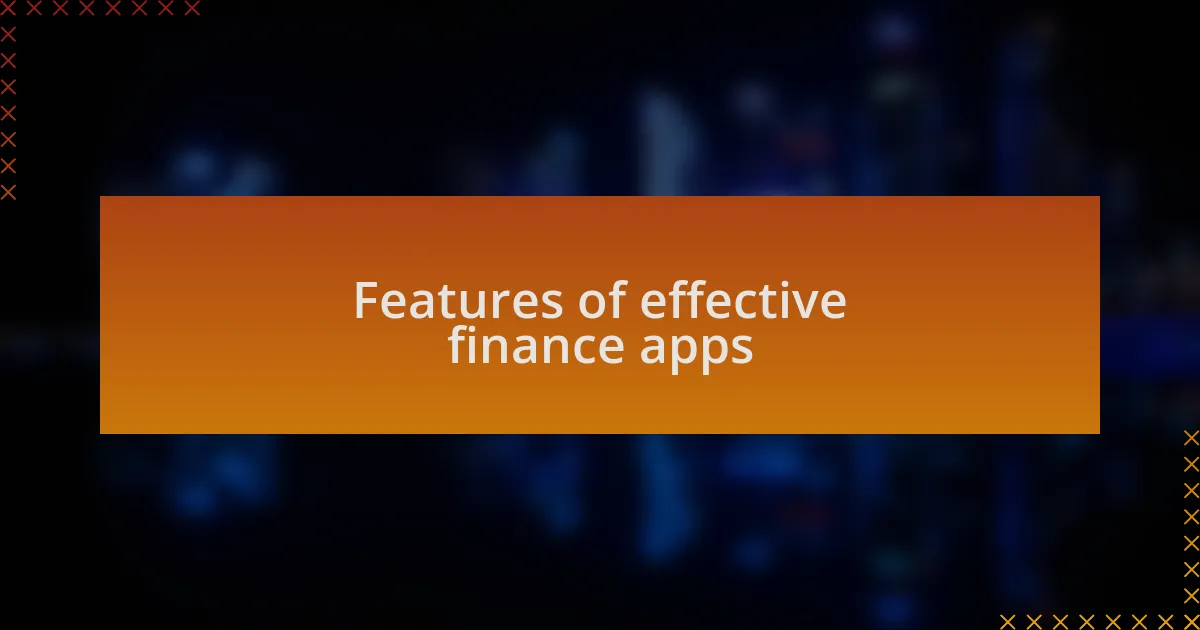
Features of effective finance apps
One of the standout features of effective finance apps is their user-friendly interface. I remember trying several apps that were so complicated that I abandoned them within minutes. When I finally found one that made navigation a breeze, it felt like a weight lifted off my shoulders. Have you ever struggled with an app that was just too clunky to use?
In addition to simplicity, automation is vital. I find it incredibly useful when an app automatically categorizes my transactions for me. On one occasion, it caught frequent, unexpected charges from a subscription I had forgotten about. Seeing that immediately prompted me to cancel it, saving me from a growing bill. How comforting is it to have that level of awareness without extra effort on your part?
Lastly, the ability to sync across devices enhances accessibility and convenience. During a busy week, I appreciated that I could check my finances on my phone while waiting for an appointment, or on my tablet at home. This level of connectivity ensures that my budgeting and spending strategies remain at the forefront of my mind, no matter where I am. Have you felt that peace of mind knowing your financial data is always within reach?
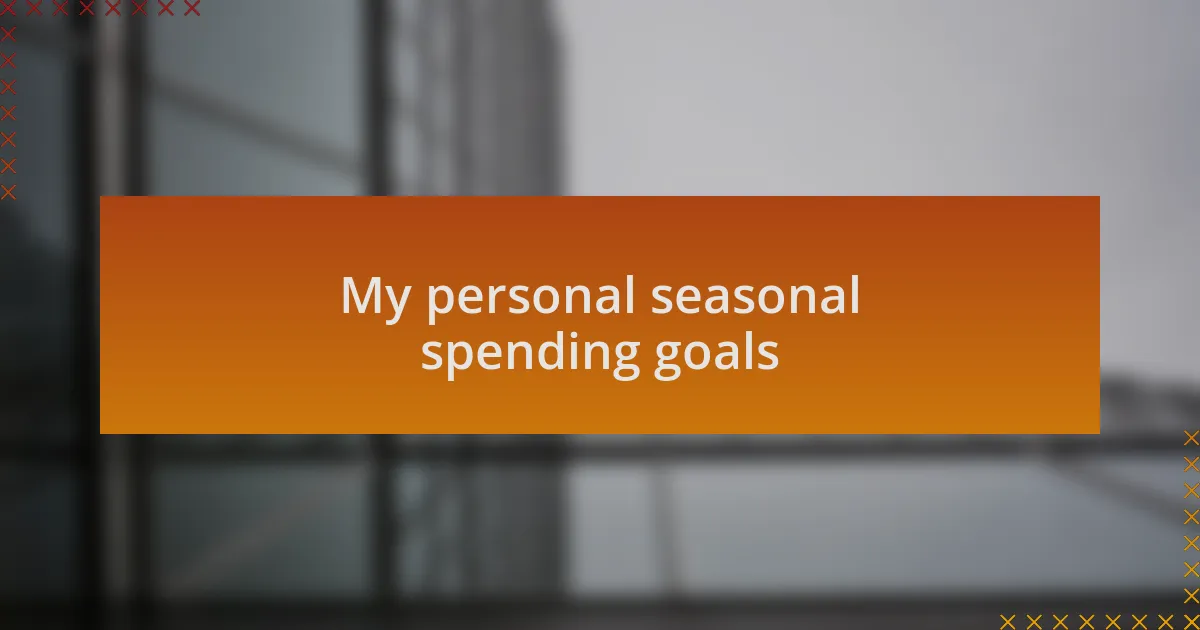
My personal seasonal spending goals
Setting my seasonal spending goals has been a game changer for me. For example, every holiday season, I allocate a specific budget for gifts and festivities. I remember one year when I overspent, feeling the aftermath linger well into January. Have you ever faced a financial hangover after the holidays?
As spring approaches, I look towards planning trips and outings. I create a travel fund, ensuring that I don’t end up scrambling to cover unexpected expenses. I once set aside a monthly amount for a weekend getaway, and when the time came, I felt a mix of excitement and relief knowing I could enjoy myself without financial worries. Isn’t it liberating to travel with peace of mind?
In the back-to-school season, I find it crucial to set limits for supplies and clothing for my kids. It’s easy to get carried away with the latest trends that kids often want. I vividly recall a time when I overshot my budget and had to cut back on other essentials. Now, I keep a list and stick strictly to it. How do you manage the tension between what they want and what you need to spend?

Tips for using apps effectively
When using finance apps, I’ve found it essential to familiarize myself fully with their features. I remember the first time I downloaded a budgeting app; I felt overwhelmed by options. Spending a little time exploring the settings and tools transformed my experience entirely. Have you ever missed out on useful features just because you didn’t take a moment to learn about them?
Another tip is to set reminders for important budgeting tasks. I’ve learned the hard way, like when I forgot to update my budget after a special event, which led to a sudden realization that I was way off track. Now, I create alerts for regular reviews, ensuring I stay on top of my finances. How often do you find yourself forgetting to check your expenses?
Lastly, connecting your app with your bank accounts can save you a lot of time and effort. Initially, I was hesitant about syncing my finances, worried about security. However, once I took the plunge, it simplified my budgeting process tremendously. The convenience of tracking expenses in real-time made me question: why haven’t I done this sooner?
![]()
Tracking and adjusting your strategy
Keeping a close eye on your spending trends is crucial for adjusting your strategy effectively. I remember a time when I didn’t track my expenses during the holiday season. Initially, everything seemed in order, but by January, I was shocked to see how much I overspent. Reflecting on my income versus my holiday expenses taught me the importance of regularly checking in with my financial goals. Have you ever had a surprise expense that completely derailed your budget?
Another aspect is to be flexible with your strategy. There was a year when I decided to allocate more funds for holiday travel, thinking it would be a memorable experience. However, midway through the season, I realized the decision meant cutting back on gift spending, which was equally important to me. By adjusting my priorities and reallocating funds, I managed to balance experiences and traditions. Have you ever felt the need to shift your budget midway through a season?
Finally, regularly reviewing and adjusting your budget based on past spending can lead to more informed decisions. After tracking my patterns, I noticed that my dining expenses skyrocketed every February. By recognizing this, I adjusted my dining budget down and added more for entertainment since I’d rather invest in experiences with friends. It was a simple change, but it greatly enhanced my financial satisfaction. What adjustments can you make to better align your spending with what truly brings you joy?